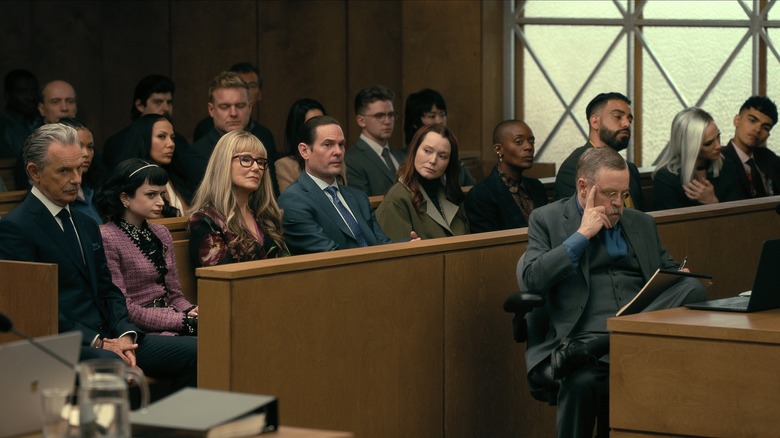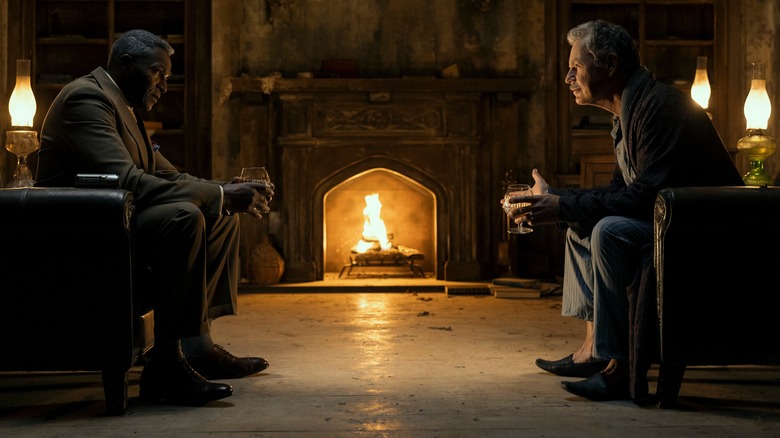When Is The Fall Of The House Of Usher Set & Why Is It Important?
Contains general spoilers for "The Fall of the House of Usher"
Edgar Allan Poe's timeless tale of presumed death, generational curses, and familial tension receives a chilling update in Netflix's latest (and final) Mike Flanagan series, "The Fall of the House of Usher." Of course, there are several differences between Poe's horror story and Flanagan's series. One of the most interesting changes from Poe's source material is how the series crafts a wide-spanning tale — having characters age, grow, and meet their doom within decades instead of hours.
Flanagan's miniseries sprawls from the 1950s to the 2020s, following Roderick Usher (Bruce Greenwood) from his childhood to the grave. However, Poe's short story about the Usher family covers only two weeks of time. They are, admittedly, two eventful weeks that are (presumably) set in its publication year, 1839. Poe's story doesn't give his characters much time to escape the family home — never mind having children. While it's likely that Netflix wanted to create a sprawling epic of family intrigue instead of directly adapting Poe's short story, it's clear that the creative teams involved also wanted to mirror the Usher family's spiraling demise with the rise and fall of another infamous drug-manufacturing clan: The Sackler Family.
The Fall of the House of Usher carefully parallels the rise of opioid crisis in America
One likely reason why Flanagan's "The Fall of the House of Usher" takes place in the modern era is to draw parallels between the fictional drug-manufacturing Usher family and the real-life Sackler family. Heads of Perdue Pharma LP, the Sackler family were investigated in 2020 by the United States Justice Department – leading to multiple class-action lawsuits. State attorneys alleged that Perdue lied to doctors and marketed their drug deceptively — encouraging medical professionals to prescribe oxycontin to an increasing number of people in increasingly higher doses and for longer spans of time than necessary. Prosecutors claimed the company's advertising intentionally targeted vulnerable parties such as elderly patients. To date, this medical crisis has reportedly claimed over 500,00 lives in the U.S. In total, 23 states and 2,0000 local governments were represented in cases against the Sackler family. Perdue became the subject of a three-count felony federal information suit. Tentatively, the company settled these collective lawsuits for $5.5 billion in 2022 – leading Purdue Pharma LP to file for bankruptcy, dissolve, and have its assets set to be repurposed for public use.
However, the company's bankruptcy was put on hold after intervention from the United States Supreme Court in August 2023. Why? The bankruptcy settlement would grant the Sackler family legal immunity and protect them from further legal action. The Supreme Court is slated to review their case in December 2023.
The Usher's ignominious doings are way worse than the Sackler's
Similarly, The Usher family has caused an opioid crisis after irresponsibly marketing (and lying about) various pain-killing drugs. Additionally, they're accused of doing dire environmental damage — conducting illegal medical trials and violating several established regulations and statutes. Within the series, Prospero (Sauriyan Sapkota) and Roderick (Bruce Greenwood) are indicted by the Federal government on 73 charges, with Roderick being accused of defrauding the United States. The Usher family dodges meetings and refuses to address the issue until the federal indictments go down — seemingly ill-equipped to handle the consequences of their family's actions.
But the trial is interrupted by death after death. Ultimately, it takes the passing of every direct member of the Usher family line for Fortunato to be shut down. Like Perdue Pharma's, Fortunato's assets are returned to the public. The Phoenix Foundation, a drug rehabilitation charity, rises from Fortunato's ashes. Still, it's only the family attorney and fixer Arthur Pym (Mark Hamill) who sees jail time.
Whether or not the Sackler family will see any criminal time remains to be seen. Currently, it's estimated that the Sackler family is still worth $15 billion and no member of the clan has been charged. For now, Flanagan's fictional series serves as a cathartic call to action for Big Pharma to face the consequences of their profits.


